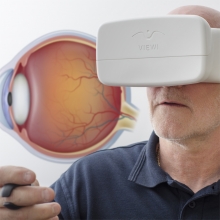 At their annual Innovation Day industry event, engineering design and development firm Cambridge Consultants demoed a number of early projects involving robotics, augmented reality, mobile devices, and other technologies. In between keynote presentations from industry executives, MobiHealthNews had some hands-on time with the following healthcare-focused prototypes:
At their annual Innovation Day industry event, engineering design and development firm Cambridge Consultants demoed a number of early projects involving robotics, augmented reality, mobile devices, and other technologies. In between keynote presentations from industry executives, MobiHealthNews had some hands-on time with the following healthcare-focused prototypes:
Mobile glaucoma screening
Currently, regular glaucoma screening involves a trip to the specialist and a large clinical device costing hospitals tens of thousands of dollars. Cambridge Consultants’ Viewi, on the other hand, consists of a small head-worn smartphone cradle, a handheld clicker, and an app. The system conducts its test by displaying flashing dots in various locations, with patients clicking a button each time they see one of the images. The result is an easy-to-use diagnostic that is able to track the onset or development of vision impairment due to glaucoma.
“We’ve used our optical expertise – coupled with our algorithm skills – to show how a simple, affordable, fast glaucoma screening test that patients can do at home is entirely feasible,” Simon Karger, head of surgical and interventional products at Cambridge Consultants, said in a statement. “The Viewi technology could provide a valuable early warning system for people at risk of developing glaucoma, as well as patients who need to monitor the effects of the disease on their vision. … It could also make the static perimetry test accessible to more patients in developing countries, where expensive clinical equipment and trained professionals are often in short supply.”
AR-assisted surgery
 Another of the company’s prototypes employed Microsoft’s HoloLens headset to assist with minimally invasive surgical procedures. The technology roughly simulates the locations of various layers of a patient’s body and, through the AR interface, allows surgeons to see through the skin, organs, and ribcage simply by adjusting their neck. In addition, the system displays informational graphs and images as if they were charts hanging on a wall, and allows wearers the ability to easily move and resize them with hand motions or voice commands.
Another of the company’s prototypes employed Microsoft’s HoloLens headset to assist with minimally invasive surgical procedures. The technology roughly simulates the locations of various layers of a patient’s body and, through the AR interface, allows surgeons to see through the skin, organs, and ribcage simply by adjusting their neck. In addition, the system displays informational graphs and images as if they were charts hanging on a wall, and allows wearers the ability to easily move and resize them with hand motions or voice commands.
“This innovative development is the result of our extensive experience of surgical equipment innovation and our understanding of the operating theatre environment and workflow. It has the potential to enable more surgeons to carry out complex operations at lower risk and with better results for patients,” Karger said in a statement. “While today’s platforms still need to mature before they are ready for clinical deployment, it is clear to us that the underlying technology holds great promise for critical applications like surgery.
Implant and device charging
The design company also showed off a new wireless charging tech to be integrated within medical implants or other wearable devices. Whereas many of the systems currently employed require external power sources to be aligned and rigidly held in place, Cambridge Consultants said their MagLense technology allows implants to easily find the a power source, thereby permitting an continuous and efficient charge (although the early prototype did take a few moments to find its implanted device during MobiHealthNews’ demo). The company said that the system is capable of charging through the body up to a range of 50 centimeters, can deliver power to a number of different implant locations, and knows to only target the desired implant.
“This is a real breakthrough, addressing one of the core weaknesses in today’s implant design and solving many of the current clinical and patient challenges,” Dr. Arun Venkatasubramanian, head of implanted connectivity at Cambridge Consultants, said in a statement. “By using a power source completely separate from the body, and only when needed, a patient’s day-to-day routine will be transformed and their quality of life drastically improved.”















